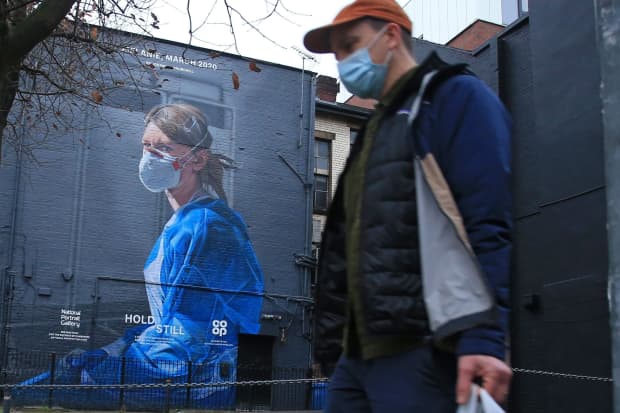No products in the cart.
Europe Markets

New COVID-19 restrictions in the U.K. will see most region return to tougher measures than before the national lockdown
Lindsey Parnaby/Agence France-Presse/Getty Images
European stocks were mixed early on Friday as investors digested the extension of COVID-19 restrictions across the continent and concerns over AstraZeneca’s vaccine candidate.
The pan-European Stoxx 600
SXXP,
fell 0.1% in early trading, while the German DAX
DAX,
was flat and the French CAC
PX1,
rose 0.2% on what looked set to be a quiet end to the week.
U.S. stock futures moved higher ahead of a shortened trading session on Wall Street, with Dow futures
YM00,
up 0.2%, or 49 points, Nasdaq futures
NQ00,
up 0.3% and S&P 500 futures
ES00,
0.1% higher. The New York Stock Exchange and Nasdaq will close at 1pm ET, having been closed on Thursday for the Thanksgiving holiday.
The FTSE 100
UKX,
index slipped 0.8% after the U.K. government announced that most regions would return to tougher restrictions once the national lockdown is lifted next week. The majority of the country will be under tighter measures than before the country went into lockdown on Nov. 5.
German Chancellor Angela Merkel said Thursday the country’s partial lockdown would be extended until Dec.20, while France will remain locked down until Dec.15, raising concerns over the economic impact in the coming months ahead of a potential vaccine.
“This end of the week caution appears to be predicated on concern over the short-term economic outlook, as the extension of tighter restrictions on economic activity in France, Germany and the U.K. creates further uncertainty over the potential for permanent economic scarring as we head into 2021,” CMC Markets analyst Michael Hewson said.
AstraZeneca
AZN,
shares slipped 0.9% early on Friday as questions were raised over the recent efficacy data of its experimental vaccine, being developed by the University of Oxford. The British drugmaker said earlier this week the vaccine was around 90% effective when volunteers were given a half-dose shot followed by a full dose a month later, but 62% effective when two full doses were given.
After the company admitted an error led to the different amounts given to volunteers, CEO Pascal Soriot said an additional study was needed, in an interview with Bloomberg.
In more positive news, the vaccine has been referred to the U.K. regulator for approval, which Soriot said was unlikely to be held up by any additional international study.
Stocks in focus
Shares of Banco de Sabadell
SAB,
fell 13% after the Spanish bank said merger talks with bigger rival BBVA
BBVA,
had ended. Sabadell said it will instead launch a new strategy prioritizing its Spanish domestic business.
British pub chain JD Wetherspoon
JDW,
slipped 2% as the company confirmed 366 of its pubs would have to close under the new U.K. measures, while a further 435 would be open but could only serve alcohol with a meal.


